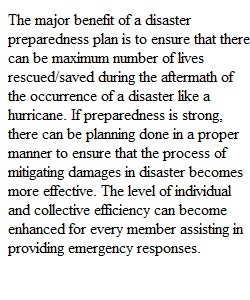


Q With the increased disasters and mass casualties in recent years, there is an increased need for emergency management and response. However, it is necessary to plan and prepare for emergencies long before they occur. Emergency preparedness should be a multi-agency effort which incorporates the whole community. After the 11 September 2001, tragedy in New York City, the Hurricane Katrina disaster in New Orleans on 29 August 2005, and the bioterrorism scares in recent years, hospitals have been forced to reevaluate the effectiveness of their current disaster preparedness plans. They must assess whether the current plans will work in the event of an emergency, and the administration must decide what changes must be made to make the plans more successful. Discuss the following (please answer the questions based on your degree program of study): MPH Students: 1. Discuss the benefits of a disaster preparedness plan in a hospital or public health organization. 2. What are the benefits of emergency planning? 3. Given the recent changes in the need for better disaster preparedness, should these alterations in disaster preparedness be left up to the hospital, or should the government take a more central role in all disaster preparedness? EDM Students: 1. Discuss the benefits of a disaster preparedness plan in an emergency management or law enforcement organization. 2. What are the benefits of emergency planning? 3. How can law enforcement, fire rescue, or emergency management partner with hospitals or public health organizations to improve disaster preparedness? ************************************************************************************************************************************* ALL FORUMS Initial Response: Initial responses should be no less than 450 words in length not including your reference(s) and supported by at least two references (aside from the textbook). Initial responses are due no later than 11:55 p.m. ET on Wednesday, Day 3 of each week. This allows time for other students to respond to your initial response. Please be aware that just “cutting and pasting” sections of articles (in lieu of writing an original initial post) is not acceptable and will negatively impact your grade. Peer Responses: Students are required to respond to at least two (2) other student’s initial postings (and the instructor) with significant comments that have substance. Peer responses are due no later than 11:55 p.m. ET on Sunday, Day 7 of each week. All peer responses must be substantial and significant and should be no less than 200 words in length not including your reference(s) and supported by at least one reference (aside from the textbook). If possible, one of the responses to another’s work should be from an opposing viewpoint. Your response to your peers work should be engaging and informative with good substance (just stating “I agree…” is not acceptable). Your responses should contribute in a meaningful way to helping advance our knowledge of the topics the class explores. Your responses to another’s work should be posted as a sub-thread to the student’s original posting of whom you are commenting. For all Forum activity, students are encouraged to use the APUS Online Library to search for references that help support their argument (in addition to textbook material). All posts should contribute and advance the class knowledge of the course themes. The Forum provides an opportunity for everyone to analyze work from many different perspectives. Late Forum posts receive a 10% per day late penalty. If your 2 peer responses are posted after the week is ended (after Day 7, Sunday) they receive a zero, in that the discussion is over and you cannot receive credit for participation in a discussion with others after the discussion week has closed.
View Related Questions